WMG News
£1.5m gift from TVS Motor Company helps create new Lord Bhattacharyya Chair in Engineering Education at WMG, University of Warwick
A substantial gift of £1.5 million from TVS Motor Company will help create a crucial new Professorial post in WMG, University of Warwick - the Lord Bhattacharyya Chair in Engineering Education.
The gift celebrates TVS Motor Company’s close relationship with WMG and will continue the legacy of the late Professor Lord Kumar Bhattacharyya,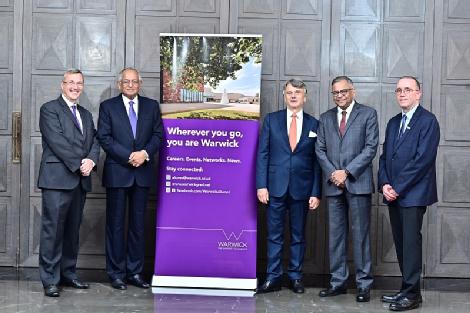 enhancing WMG’s academic expertise in the understanding, development and teaching of engineering and manufacturing internationally.
enhancing WMG’s academic expertise in the understanding, development and teaching of engineering and manufacturing internationally.
The news was announced in Mumbai yesterday (Monday, 7 November) at a reception for University of Warwick graduates hosted by Professor Stuart Croft, Vice-Chancellor and President of the University.
Warwick has a close network of more than 5,500 alumni in India and is the most successful Russell Group university for recruiting students from India. This is Professor Croft’s first visit to the country for the purposes of encouraging support from alumni and friends for the University’s vision.
Professor Lord Bhattacharyya sadly passed away on the 1 March, 2019. To celebrate his legacy in global manufacturing and innovation, the new Chair will drive forward innovations in research-led teaching and scholarship. Just as Professor Lord Bhattacharyya played a significant role in building relationships between India and the UK, the appointee will be responsible for establishing connections for UK higher education and WMG in Asia, particularly in India and Hong Kong.
This will include new ways to inspire young people from different backgrounds to pursue engineering careers through the WMG Academies for Young Engineers, degree apprenticeships, and professional skills programmes delivered by the WMG Skills Centre, along with an opportunity to explore innovation in the higher education space more widely.
Sir Ratan Tata, former Chairman of Tata Sons, said he was delighted to hear about the gift.
“I deeply valued my friendship with Kumar and know the philanthropy of TVS Motor Company will continue his vison of creating innovative, engaging, and authentic learning opportunities for a diverse range of students. Strong industry links were so important for Kumar and it’s exciting that WMG is working closely in partnership with this prestigious motorcycle company.”
Mr Venu Srinivasan, Chairman Emeritus of TVS Motor Company and Director of Tata Sons, said: “WMG excels because it has the momentum created by Kumar. It wouldn’t have happened without him, but it continues after him. Kumar always said a true legacy was an institution that does better after your time. We are delighted to make a gift that continues this ambition.”
Mr N. Chandrasekaran, Chairman of Tata Sons, said: “Lord Bhattacharyya created a world class, leading-edge capability at WMG. The new Chair in Engineering Education will be a crucial addition to their academic leadership, ensuring the next generation of engineering leaders are inspired through the highest levels of teaching. I’m thrilled the Chair will also work to enhance international connections for both WMG and the University of Warwick.”
Warwick alumnus Professor Sir Ralf Speth (EngD Engineering, 2004-08), Chairman of TVS Motor Company, Director of Tata Sons, and former CEO of Jaguar Land Rover, said:
“Kumar was very keen on creating top talents and innovative break-throughs. He liked curious, younger people. He believed in the powerful momentum resulting out of a special atmosphere of new technologies and curious, passionate talents.”
Mr Sudarshan Venu (MSc International Technology Management, 2010-12), Managing Director of TVS Motor Company, said: “I am grateful for having been mentored by Lord Bhattacharyya, who had a tremendous impact on me and taught me a lot about the global automotive industry. TVS has had a strong partnership with WMG covering the areas of education, research, and joint projects. We look forward to building on this in the future as well.”
In 2016, WMG was awarded a Regius Professorship in Manufacturing, which was bestowed by Her Majesty Queen Elizabeth in recognition of the transformational contributions that Professor Lord Bhattacharyya made to UK manufacturing. The new role will complement the Regius Professorship and celebrate Lord Bhattacharyya’s impact on engineering and manufacturing internationally.
The Chair in Education role was initially established in 2021 thanks to a private philanthropic donation of £1.5 million, gifted by a Warwick alumnus. The additional gift from TVS Motor Company will help future-proof the post for generations to come and help the University achieve its goals for the Chair. The University intends to recruit for the role in 2023.
Professor Stuart Croft, Vice-Chancellor and President of the University of Warwick, said: “We are extremely grateful to TVS for making this generous gift to support WMG in enhancing and exceeding educational standards. The new role of Lord Bhattacharyya Chair in Engineering Education will continue Professor Lord Bhattacharyya’s legacy, and help us thrive in connecting education, research and industry, setting up our graduates for successful futures.
“Warwick has a fantastic network of alumni in India, and I’m delighted to have the opportunity to meet many of our graduates this week to explore how they can support the University’s vision for the future in the world’s largest democracy.”
Professor Robin Clark, Dean of WMG, University of Warwick, who is visiting India this week alongside Professor Croft, said: “We would like to thank TVS Motor Company for their generous gift. Their support will enable the new Lord Bhattacharyya Chair in Engineering Education role to preserve and expand Professor Lord Bhattacharyya’s pursuit of excellence in education, whilst further developing the relationships between our teaching and research.
“We anticipate that the successful appointee will further extend WMG’s teaching partnerships with industry and our international partners in Asia, enabling us to facilitate high quality and meaningful professional, international and intercultural learning opportunities that broaden the global perspectives of our students and provide the skills needed for current and future industry requirements.”
ENDS
Notes to Editors
WMG, University of Warwick
WMG is a world leading research and education group, transforming organisations and driving innovation through a unique combination of collaborative research and development, and pioneering education programmes.
As an international role model for successful partnerships between academia and the private and public sectors, WMG develops advancements nationally and globally, in applied science, technology and engineering, to deliver real impact to economic growth, society and the environment.
WMG’s education programmes focus on lifelong learning of the brightest talent, from the WMG Academies for Young Engineers, degree apprenticeships, undergraduate and postgraduate, through to professional programmes.
An academic department of the University of Warwick, and a centre for the HVM Catapult, WMG was founded by the late Professor Lord Bhattacharyya in 1980 to help reinvigorate UK manufacturing and improve competitiveness through innovation and skills development. Taking a partnership approach with Indian collaborators, aiming to understand their requirements from both technical and skills-based perspectives, means WMG provides a holistic approach to truly benefit industry and academia. This has led to long-term, valued relationships.
WMG engages with Indian industry and academic partners across the breadth of its research, including advanced materials and sustainable manufacturing, electrification, visualisation, and metrology. Routes to collaboration include tailored industry-facing skills courses, training industry-based Master’s students, collaborative PhD studentships, and joint research projects.
Highlights from TVS relationship:
- Two-year MSc by research programme delivered to TVS staff
- Joint EngD programme
- On-site delivery of short courses on electric vehicle technology
- Research and testing programme for automotive batteries and electrification
- Over 10 years of active partnership
Highlights from TATA relationship:
- WMG hosts the Tata Steel Professor of thermo-mechanical processing, Professor Claire David, who leads our engagement with TATA Steel
- WMG Catapult has a two-year programme with TATA Steel UK around advanced forming, welding, and coatings for steels
- WMG with TATA Steel UK and Swansea University form the EPSRC-funded SUSTAIN Future Manufacturing Hub, developing advanced route to greener, more sustainable, high-performing steels
- An EPSRC Prosperity Partnership project in which fundamental research is deployed to answer business-led challenges. The partnership is developing new routes for rapid alloy processing
- The European branch of TATA Steel is a co-partner in the National Automotive Innovation Centre with WMG and JLR – the centre, based at WMG, co-locates industry and academic partners to develop the research and skills base for pioneering future mobility solutions
Wider University of Warwick collaborations in India include a partnership with IIT Kharagpur designed to meet challenges of importance to the UK and India.
Over 90% of engineering research at the University of Warwick recognised as world-leading or internationally excellent by the Research Excellence Framework
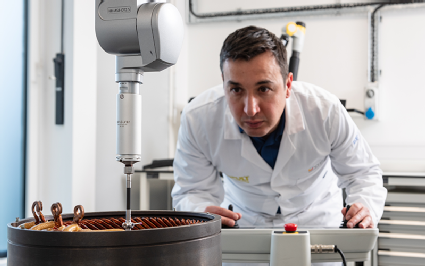
The high quality of engineering research at the University of Warwick has been recognised within the results of the 2021 Research Excellence Framework (REF), which were made publicly available today.
The University’s engineering research has been ranked 20th out of 89 UK institutions (according to Times Higher Education), with over 90% of engineering research outputs being identified as world-leading or internationally excellent.
Colleagues from research, technical services, teaching and professional services at WMG and the School of Engineering combined to create a strong submission within the ‘B12 Engineering’ category, augmented by related research from the Department of Physics.
Reflecting on the results, Professor Robin Clark, Dean of WMG and Director of Education said: “With 93% of our engineering research rated world leading or internationally excellent, the joint submission with our colleagues in the School of Engineering demonstrates the quality and breadth of work being undertaken at the University.
“Covering a diverse range of topics and delivering cross disciplinary research to address global and industrial challenges is something we and our industry partners value, and it is something we will develop further in the future.”
Professor David Towers, Head of the School of Engineering added: “The results show strong positive progression in research outputs and impact case studies. Most notably, we have – and are continuing – to invest in research infrastructure, in clean energy technologies, biomedical engineering and sustainable cities with a core strength in predictive modelling, the majority of which is ranked as world-leading. Hence, we are optimistic of our potential to further expand our academic and societal impact over the coming years together with our industry partners.”
The collective submission acknowledged the work of the University’s engineering-based researchers, spanning key areas such as: embedding sustainability through energy innovation; helping people live longer and healthier lives through biomedical engineering; realising visions for future cities; maximising the potential of technology and society; and embedding innovation throughout materials and manufacturing.
As part of this, a series of case studies were submitted to illustrate the breadth and depth of impact generated throughout engineering research at the University. Over 60% of these case studies have received the highest rank of ‘world-leading’.
Professor Paul Jennings, Director of Research at WMG commented: "Our research constantly evolves to address the needs of our industry partners across many sectors. So, to achieve this recognition for its quality and impact, especially during a period of significant growth and change, is testament to the capability and hard work of colleagues across the whole of our department."
The REF is the UK’s system designed to evaluate the quality of research across higher education. The assessment is conducted by Research England (as well as equivalent funding bodies for institutions across Scotland, Wales and Northern Ireland) through a process of expert review by academics, international members and research users.
WMG’s contribution within the submission involved significant partnership with industry and public bodies. The technical focus has evolved since REF 2014, to cover key themes such as vehicle electrification; sustainable materials; resilient manufacturing; and opportunities from improved use of data and connectivity. WMG's research also informs its education provision and skills programmes, as well as the national agenda, through initiatives like the National Electrification Skills Framework.
The School of Engineering spans Civil Engineering, Mechanical, Materials and Process Engineering, Electrical and Electronic Engineering, and Systems and Information Engineering, embedded within a single unified department to enable cross-fertilisation in research.
The results also recognised an increase in the economic and societal impact of the University’s research as a whole, which highlights the real-world benefit of the University’s work.
Commenting on the REF2021 assessment, Professor Stuart Croft, Vice-Chancellor at the University of Warwick, said: “These results demonstrate the truly world class quality of our research, our approach and most importantly our people.
“This is an outstanding achievement and a source of tremendous pride for everyone connected with this great institution.
“Our research has always been driven by a strong sense of purpose and commitment to ensuring what we do has a positive impact on wider society. From helping to save lives through our modelling work during the Covid pandemic, and the development of new, sustainable forms of transport and energy, to making a fairer criminal justice system, and supporting our cultural institutions and creative industries, our research delivers real-world benefit.
“Overall, the REF results also reflect the remarkable strength, quality and breadth of research within the UK. The future for our researchers is bright and exciting. We will continue to push boundaries, innovate and learn through our research work so we can benefit more people, in more places, more often.”
Read more about WMG’s research impact here and find out more about WMG’s REF submission here.
Read more about the School of Engineering’s research impact here and more about their REF submission here.
Read more about the University’s research impact and innovation here. The University’s announcement can be viewed here.
£1.5m gift creates new Lord Bhattacharyya Chair in Education role at WMG, continuing Lord Bhattacharyya’s legacy
§ University of Warwick receives £1.5 million philanthropic gift from an alumnus to WMG to create a new role, entitled the Lord Bhattacharyya Chair in Education
§ Gift recognises the opportunity to continue the late Professor Lord Bhattacharyya’s legacy to education
§ It will allow WMG to enhance their exceptional academic expertise in the understanding, development and teaching of engineering and manufacturing internationally
§ This is the most recent £1 million plus gift to Warwick’s portfolio, reflecting continuing enthusiasm for supporting exceptional research and education, despite the global financial impact of the pandemic
A private philanthropic gift of £1.5m from a Warwick alumnus has created a new role in WMG, entitled the Lord Bhattacharyya Chair in Education. The new role will continue the late Lord Bhattacharyya’s legacy enhancing WMG’s academic expertise in the understanding, development and teaching of engineering and manufacturing internationally.
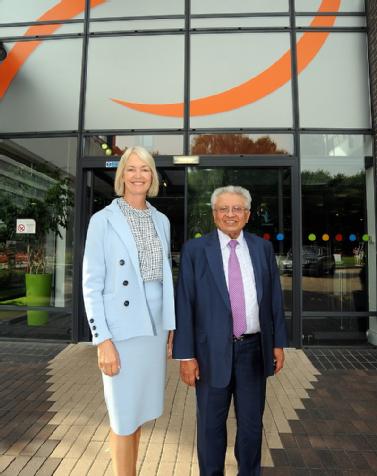 The late Professor Lord Kumar Bhattacharyya passed away on the 1st March 2019, and in order to endure his legacy to global manufacturing and innovation, the new role of Lord Bhattacharyya Chair in Education will enhance WMG’s exceptional academic expertise in the understanding, development and teaching of engineering and manufacturing.
The late Professor Lord Kumar Bhattacharyya passed away on the 1st March 2019, and in order to endure his legacy to global manufacturing and innovation, the new role of Lord Bhattacharyya Chair in Education will enhance WMG’s exceptional academic expertise in the understanding, development and teaching of engineering and manufacturing.
The Lord Bhattacharyya Chair in Education will be a senior post and will be a member of the WMG Education Executive, that will drive forward innovations in research-led teaching and scholarship, using the evidence to bring about the changes the late Lord Bhattacharyya wanted to see in the world. This will include new ways to inspire young people from different backgrounds to pursue Engineering careers through the WMG Academies for Young Engineers, degree apprenticeships, and professional skills programmes, along with an opportunity to explore innovation in the higher education space more widely.
In 2016 WMG, at the University of Warwick, was awarded a Regius Professorship in Manufacturing, which was bestowed by Her Majesty the Queen in recognition of the transformational contributions that Professor Lord Kumar Bhattacharyya made to UK manufacturing. The new role of Lord Bhattacharyya Chair in Education will complement the Regius Professorship and celebrate Lord Bhattacharyya’s impact on engineering and manufacturing internationally.
The new post will provide academic leadership at the interface between research and teaching, helping to ensure that WMG’s fundamental and applied research outputs in engineering and manufacturing are placed at the heart of a teaching agenda that promotes and embeds innovation.
Margot James, Executive Chair of WMG, University of Warwick, comments:
“We are incredibly grateful for such a generous gift from a member of our alumni community, which will enable the new Lord Bhattacharyya Chair in Education role to ensure that Professor Lord Bhattacharyya’s emphasis on the pursuit of excellence in education is preserved.
“We anticipate that the successful appointee will extend further WMG’s teaching partnerships with industry and our international partners in Asia, enabling us to facilitate high quality and meaningful professional, international and intercultural learning opportunities, that broaden the global perspectives of our students.”
Professor Stuart Croft, Vice Chancellor of the University of Warwick, comments:
“We are extremely grateful to the alumnus who has gifted such a generous amount despite the financial impact of the pandemic. Donations like this help us stay committed to enhancing and exceeding education standards.
“The new role of Lord Bhattacharyya Chair in Education at WMG will continue Professor Lord Bhattacharyya’s legacy, and help us thrive in connecting education, research and industry, setting up our graduates for a successful future.”
Professor Robin Clark, Dean of WMG, University of Warwick adds:
“WMG is an internationally renowned academic department of the University, known for bridging the gap between industry and academia, working with companies and organisations on both fundamental and applied research and importantly the development of education programmes which will provide the skills needed for both the current and future needs of industry.
“The new Lord Bhattacharyya Chair in Education role will help us to further develop the relationship between our teaching and our research. In doing this it will enable us to develop an evidence base on which to create innovative, engaging and authentic learning opportunities for a diverse range of students. This, with strong industry links, is something that we feel Professor Lord Bhattacharyya would be excited about.”
While the generous gift of £1.5m from a Warwick alumnus will establish the post, the University is seeking further philanthropic support to achieve its goal for the Chair. It is hoped the new role will be recruited to in 2022.
ENDS
18 NOVEMBER 2021
NOTES TO EDITORS
High-res images available at:
https://warwick.ac.uk/services/communications/medialibrary/images/august2016/margot_james_mp_and_professor_lord_bhattacharyya_1st_september_2016.jpg
Caption: Margot James, Executive Chair of WMG, University of Warwick with the late Professor Lord Bhattacharyya in 2016
Credit: WMG, University of Warwick
For further information please contact:
Alice Scott
Media Relations Manager – Science
University of Warwick
Tel: +44 (0) 7920 531 221
E-mail: alice.j.scott@warwick.ac.uk
Five WMG researchers to become Turing Fellows this academic year
Five members of staff from WMG have been named as Fellows of the Alan Turing Institute this year.
Turing Fellows are scholars with proven research excellence in data science, artificial intelligence (AI) or a related field, whose research will be significantly enhanced through active involvement with the Turing network of universities and partners.
The Alan Turing Institute is the UK’s national institute for data science and AI, aims to attract and retain exceptional researchers in artificial intelligence and the University of Warwick is a founding partner.
Covering a broad view of AI, including applications of foundational disciplines across mathematical sciences, statistical sciences, computational sciences and engineering, Fellows work together across disciplines and have the opportunity to collaborate with academia, industry, government and the third sector.
In total 37 researchers from the University of Warwick, from across the fields of mathematics, life sciences, statistics, computer science, business, medicine and engineering, have been named as Fellows of the Alan Turing Institute this year.
Pro Vice Chancellor for Research at the University of Warwick, Professor Caroline Meyer, said: “I am delighted that so many Warwick researchers have been named as Fellows of the Alan Turing Institute this year. It shows Warwick’s strength and breadth when it comes to working at the forefront of data science and AI.
“There is a diverse range of expertise in this cohort ranging from epidemiology and disease to the disciplines of pure mathematics and computational sciences. Data Science is one of the key research priorities for the University of Warwick and our people continue to drive research through collaborative work with institutions like Turing.”
The five WMG fellows of the Alan Turing Institute are:
Associate Professor Michael Auinger
Professor Mehrdad Dianati
Assistant Professor Truong Quang Dinh
Professor Carsten Maple
The Alan Turing Institute Director and Chief Executive, Adrian Smith, said: “It gives me great pleasure to welcome this new group of Fellows. This cohort is incredibly multidisciplinary and diverse. They will bring a rich range of expertise and ensure we continue to do world-leading, impactful research.”
The full list of Warwick’s Turing fellows and details of their research can be found here: https://warwick.ac.uk/research/turing/fellows
-ends-
Notes for editors:
The Alan Turing Institute is the UK’s national institute for data science and artificial intelligence.
The Institute is named in honour of Alan Turing, whose pioneering work in theoretical and applied mathematics, engineering and computing is considered to have laid the foundations for modern-day data science and artificial intelligence. The Institute’s goals are to undertake world-class research in data science and artificial intelligence, apply its research to real-world problems, drive economic impact and societal good, lead the training of a new generation of scientists, and shape the public conversation around data.
Warwick’s Turing Fellows:
The full list of Warwick’s Turing fellows and details of their research can be found here:
https://warwick.ac.uk/research/turing/fellows
For further information please contact:
Alice Scott
Media Relations Manager – Science
University of Warwick
Tel: +44 (0) 2476 574 255 or +44 (0) 7920 531 221
E-mail: alice.j.scott@warwick.ac.uk
Warwick Boring team unveil tunnelling machine at Elon Musk competition in Las Vegas
· The Warwick Boring Team is a student-led project designing, creating and building a tunnelling machine, which they are currently racing at Elon Musk’s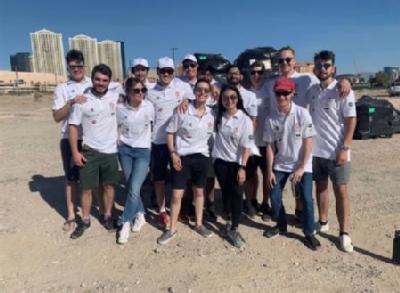 tunnelling competition organised by the boring company
tunnelling competition organised by the boring company
· Whilst at the competition in Las Vegas, the team are able to unveil their innovative machine
· The team head home on the 12th September, and hope to bring home an award with them
A team of students called The Warwick Boring Team are in Las Vegas, Nevada to competing in Elon Musk’s the Boring Company’s tunnelling competition, where they are showcasing their innovative machine for the first time.
A group of 27 students, known as the Warwick Boring Team are in Nevada, USA, competing in Elon Musk’s the Boring Company Tunnelling competition.
Current tunnelling machines are 14x slower than a snail, and cost from $100million to $1billion per mile, therefore the race to make a faster and cheaper machine is heating up.
Having been shortlisted as one of 12 teams out of nearly 400, the Warwick Boring Team aim to make our transport greener, cheaper and faster in future with their novel tunnelling machine, which will be competing against other top Universities including MIT, TUM and ETH Zurich, and industry tunnelling professionals.
With support from the School of Engineering, WMG, numerous other sponsors in the industry and the University of Warwick the students have made a machine that once scaled up the design is expected to be 80% faster than standard machines that typically dig one mile in 8-12 weeks. Moreover, the aim is to dig at a cost that is 10X cheaper than traditional machines that typically would cost $100m - $1bn per mile to construct tunnels we use today.
Sanzhar Taizhan, Founder and Co-Project Lead at Warwick Boring comments:
“After almost a year of creating, designing and building we are thrilled to see the machine here in the flesh and finished and finally in Vegas competing. The entire team have worked flat out for the last few months to get it together once we were allowed in the labs after the COVID-19 restrictions eased.
“We are so excited to see our machine working and see how it compares to other competitors. I am so proud of the team to making it to this stage no matter what the outcome is once we are out there.”
Tanner Hatzmann, the technical director at Warwick Boring adds:
“It would typically take years to create, design and build a novel machine, however we have been able to do it over the last year, even during lockdowns. The Warwick Boring tunnelling machine is exciting as it has – unique features here –. We cannot wait to see it in action and have everything crossed for a win.”
ENDS
10 SEPTEMBER 2021
NOTES TO EDITORS
High-res images available at:
https://warwick.ac.uk/services/communications/medialibrary/images/july_2021/image_3-_warwick_boring.jpeg
Caption: The Warwick Boring team in Las Vegas, Nevada, USA with their tunnelling machine
Credit: University of Warwick
https://warwick.ac.uk/services/communications/medialibrary/images/july_2021/image_4-_warwick_boring.jpeg
Caption: The Warwick Boring team in Las Vegas, Nevada, USA
Credit: University of Warwick
https://warwick.ac.uk/services/communications/medialibrary/images/july_2021/image_2-_warwick_boring.jpeg
Caption: The Warwick Boring team in Las Vegas, Nevada, USA
Credit: University of Warwick
For further information please contact:
Alice Scott
Media Relations Manager – Science
University of Warwick
Tel: +44 (0) 7920 531 221
E-mail: alice.j.scott@warwick.ac.uk
University of Warwick and WMG already on route with today’s CBI demand for “Greener Miles”
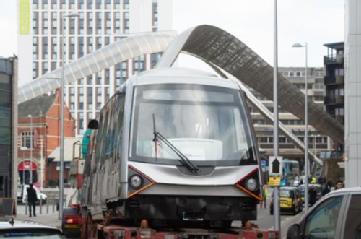 The University of Warwick is not just backing today’s CBI report ‘Greener Miles: Delivering on a net-zero vision for commuting’ – which calls on businesses to shoulder greater responsibility for ensuring their workers adopting greener travel habits – it has already taken action. The University of Warwick is already on route with a two year extensive programme to cut personal car use on campus and therefore reduce emissions. WMG, at the University of Warwick, is also deep into a suite of intense research programmes that will help industry, the public sector and consumers across the UK and beyond find sustainable transport solutions which will cut emissions.
The University of Warwick is not just backing today’s CBI report ‘Greener Miles: Delivering on a net-zero vision for commuting’ – which calls on businesses to shoulder greater responsibility for ensuring their workers adopting greener travel habits – it has already taken action. The University of Warwick is already on route with a two year extensive programme to cut personal car use on campus and therefore reduce emissions. WMG, at the University of Warwick, is also deep into a suite of intense research programmes that will help industry, the public sector and consumers across the UK and beyond find sustainable transport solutions which will cut emissions.
The new report published today (Friday 30th April 2021) by the CBI and KPMG and entitled Greener Miles: Delivering on a net-zero vision for commuting – has proposed a series of recommendations designed to cut travel emissions ahead of the Government’s upcoming Transport Decarbonisation Plan. Key among those recommendations is a call for businesses to shoulder greater responsibility for ensuring their workers adopt greener travel habits.
In fact, Transport for West Midlands (TfWM), part of the West Midlands Combined Authority (WMCA), has already teamed up with the University of Warwick on a two-year programme to do just that:
E-scooters, buses on demand, Enterprise Car Club vehicles and the Betterpoints sustainable travel app are just some of the innovative transport projects that form part of this two-year ‘Choose Your Way Warwick’ trial encouraging participants to adopt more sustainable transport choices and receive rewards for greener travel.
The trial will look at how the use of new transport solutions like e-scooters, or a car club can affect travel behaviour and replace traditional car use in and around the University campus area.
The projects include:
- Voi Technology, the UK’s leading e-scooter operator, has brought e-scooters to the University of Warwick campus as part of a pilot research project to help inform Government e-scooter legislation in the UK and research into micro-mobility.
- Membership of Enterprise Car Club with access to two low emission Hyundai Ioniq cars, for use by staff, students and the local community (subsidised for staff). The vehicles can be booked for anything from half an hour to a full day. As well as the two car club vehicles, members can also use any of the car club’s 1,400 vehicles around the UK and access the wide range of vehicles from Enterprise’s daily rental fleet.
- The West Midlands on Demand responsive bus service operates in a similar way to a taxi The convenience of the DRT will make it easier for the local community, staff and students to use public transport where a traditional bus service may not be appropriate.
The University has also made a travel policy commitment sets out that travel by train is to be the default mode of transport for journeys under 6 hours and a departmental ‘green levy’ will be charged for any air travel.
The University of Warwick’s Provost Professor Chris Ennew said of this and all the University’s sustainability initiatives:
“Warwick has always been a forward-facing university and today is no different. We know the way ahead has to lead to a better, more sustainable, relationship between people and the planet. As one of the region’s largest employers, we know Warwick has a critical role to play. We have a responsibility as a community and organisation to moderate our individual actions, our research and teaching, and how we run and develop our University. We aim to reach net zero carbon from our direct emissions and the energy we buy by 2030 and to achieve net Zero carbon emissions from emissions arising from procured goods and services by 2050.”
WMG, at the University of Warwick, are also already working with companies and organisations on a range of research programmes to support the sort of sustainable transport that will help deliver the “net-zero vision for commuting” sought in today’s CBI report and the governments Ten Point plan.
Professor David Greenwood, Professor of Advanced Propulsion Systems in WMG said:
“As the UK transitions to net zero carbon by 2050, we must ask whether and how we will commute to work in the future. A personally owned car will not be the only possible answer, and alongside our work on electrifying cars, WMG has strong interests in light rail solutions as well as increasingly autonomous vehicles. Two-wheelers and micromobility will also have a more important role to play, and our research here includes consideration of future regulation and road infrastructure as well as vehicle development and trials. All of these rely on batteries and electrification which also form a significant part of our research portfolio. “
Here are just three of WMG’s sustainable transport research projects:
· Coventry Very Light Rail tours its future home
· Novel e-assisted cargo trike launched (warwick.ac.uk)
· Pod research opens up a swarm of market opportunities for Aurrigo (warwick.ac.uk)
Note for Editors
For further information please contact:
Peter Dunn, Director of Press and Media Relations
Chief Communications Officer’s Group, University of Warwick
Mobile/Cell: 07767 655860 UK +44 (0)7767 655860 International
Email p.j.dunn@warwick.ac.uk
30th April 2021
WMG commends the advances to UK innovation, skills and industrial growth made by the Industrial Strategy Challenge Fund and supports NAO recommendations to further improve impact
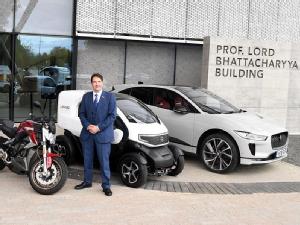 - Industrial Strategy Challenge Fund has brought government, business and researchers together at scale and at pace, supporting over 1,600 innovation projects, including Coventry’s UK Battery Industrialisation Centre
- Industrial Strategy Challenge Fund has brought government, business and researchers together at scale and at pace, supporting over 1,600 innovation projects, including Coventry’s UK Battery Industrialisation Centre
- NAO right to support streamlining start-up and approvals processes of up to 72 weeks, which can deter bids, especially among smaller businesses
- Longer term visibility of funding will be needed to give investment confidence to businesses and academia
- Mechanisms to engage private sector finance should be considered – especially as innovations become ready for market
- As industry faces challenges of the pandemic, flexibility in financing bids, especially to support smaller businesses, should be considered
- Regional and Skills strategies should be a key part of innovation funding approach
- The Catapult network provides an established and successful platform for innovation, and its geographic locations also suggest it could play a big role in regional levelling-up
- Skills must be developed alongside innovation to give the UK the ability to exploit our ISFC investments. WMG, at the University of Warwick, have been pioneers in developing skills programmes alongside innovation and industrialisation
WMG at the University of Warwick has welcomed today’s National Audit Office report on the Industrial Strategy Challenge Fund, supporting their positive assessment of the fund, and backed their calls for a more streamlined approach to innovation funding, alongside a greater emphasis on the importance of innovation for regional development and skills growth.
Professor Dave Greenwood, Director of Industrial Engagement at WMG, University of Warwick and Chief Executive of the WMG High Value Manufacturing Catapult said:
“The Industrial Strategy Challenge Fund (ISCF) has been a powerful tool to support innovation that meets the most pressing national challenges.
“The ISCF has bought government, business and researchers together at scale, and at pace, to help our transport industry decarbonise through the Faraday Battery Challenge, and is delivering vital vaccine capacity through the Vaccine Manufacturing and Innovation Centre. It has supported over 1,600 projects, including the new UK Battery Industrialisation Centre in Coventry, with over forty per cent of support in the first two waves going to small and Micro companies.
“These projects are making a difference to UK innovation, skills and industrial growth, and these successes should be celebrated.
“As the report says, however, there are always opportunities to improve how the Fund operates.
“First, we need to make the funding process faster and more agile – especially given rapid changes in the external Business and social environment, from Brexit to the Pandemic. Lengthy Approvals processes of up to 72 weeks for selecting challenges and awarding projects can deter bids, especially among smaller businesses.
“Alongside this, with much of industry dealing with financial pressures from the pandemic, government should consider relaxing some of the funding constraints on the programmes – especially where they fall significantly short of what state aid would allow, such as in the co-investment requirement from Industry, which was increased in Wave 3 of the Fund.
“Together, these steps would help position the UK for clean growth post-COVID and deliver on opportunities created for the UK supply chain by the UK/EU trade agreement.
“Looking forward, it’s essential that there is a long-term funding package in place to support the Industrial Strategy Challenges. As the report notes “The Fund was part of a one-year settlement in the spending review in November 2020.” Short term spending decisions will ultimately be detrimental to large scale industrial and academic investments – a 5 year rolling funding horizon is needed for full confidence from Industry partners. To help deliver this, we should consider the role of private finance in these programmes, and what mechanisms might de-risk industry investments to support clean growth.
“It’s also crucial that the ISCF supports regional development as part of the Government’s ‘levelling up’ agenda. Currently, almost half of funding has gone to projects in London and the South East, and while we in the West Midlands have secured significant investment, the ISCF should reflect the regional profile of Industrial R&D more closely. It is notable that government funding relative to private sector investment is much lower in the Midlands than in the South East for instance.
The Catapult network, with centres of excellence across the country, strong links to regional industries, and good networking between them, is an exemplar of how levelling up should be delivered. This established and successful platform could provide an efficient and effective means to boost R&D in under-represented regions in accordance with the recommendations of this report.
“We also need to link innovation spending to the education and skills agenda. The UK needs not just the best technologies but also the people to develop, manufacture and support them. These cannot be developed in isolation. Here, WMGs approach of delivering innovation and skills programmes together and in partnership with industry is an established model, allowing degree apprenticeships, re-training, lifelong learning to support industry innovation programmes. As the Government considers responses to the skills white paper, it should consider how future industry skills needs will be shaped by the innovations being delivered by the challenge fund, from transport electrification to digital skills.
Battery ageing model developed by WMG to support all-electric vehicles
- The issue of how long a battery pack will remain in useful operation, to guarantee a warranty for an electric vehicle battery, is a challenge faced by most car manufacturers, as they haven’t been around long enough for them to know their full lifetime
- Working as part of an APC6 funded project, WMG at the University of Warwick developed a battery model capable of forecasting the battery health for realistic usage cases
- Researchers at WMG experimentally tested the batteries for several usage cases and the model predicted the evolution of battery health with 98% accuracy
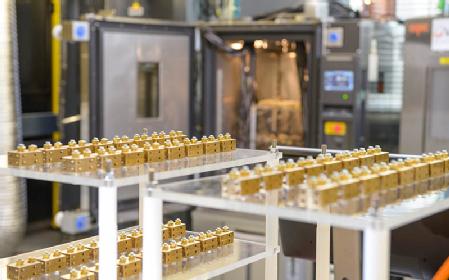
Extensive research, carried out by researchers from WMG, University of Warwick included characterisation, performance, safety and degradation testing of an EV battery, with degradation being the key focus to understand the impact on battery pack warranty.
To predict the degradation of the battery capacity researchers had to build a complex battery model, incorporating the key physics that causes batteries to age. The model was capable to predict scenarios under which a battery health will gradually fade and fulfil the warranty requirements and scenarios where the battery health will suddenly decrease after a certain usage duration.
Knowing when a battery’s health, can suddenly decrease, known as the ‘knee-point’ effect is a hotly studied problem among lithium-ion battery researchers. Researchers found that, for the particular battery investigated, by avoiding deep discharges and reducing the number of fast-charging a week, enabled the battery to perform and last the expected lifetime of the battery pack.
The aged cells were subsequently disassembled and examined for failure evidences. Fully discharging the battery at different rates demonstrated a thin film to deposit on the electrode and deform the electrode causing the active material in the batteries to delaminate. These effects can bring about a sudden reduction in the battery health.
Dr Dhammika Widanalage, from WMG, University of Warwick comments:
“We worked with the project partners to understand the needs of the battery ageing model and the usage scenarios. Using the data from our laboratories, we were then able to calibrate our model and also predict the voltage response and capacity fade of the battery under new usage cases with a very high accuracy of around 98%.”
You can train your brain to reduce motion sickness
- Everyone can suffer from motion sickness, and around one in three are known to be highly susceptible to motion sickness
- Motion sickness can occur during car travel, at sea, using virtual reality headsets and is expected to be a significant factor in self-driving car
- A cognitive training tool designed by researchers at WMG, University of Warwick has been proven to help ‘train the brain’ to reduce motion sickness by over 50%
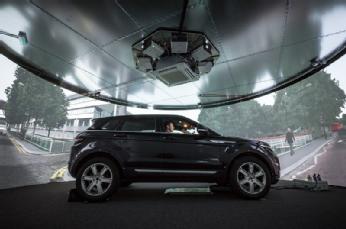
Visuospatial training exercises can train the brain to reduce motion sickness, providing a potential remedy for future passengers riding in autonomous vehicles. Researchers at WMG, University of Warwick reduced motion sickness by over 50% using the training tool and it was found to be effective in both a driving simulator and on-road experimentation.
Everyone can experience motion sickness, with 1 in 3 of us being highly susceptible to motion sickness. Motion sickness, sometimes referred to as travel sickness usually can occur during travel in cars and boats, but also when using virtual reality headsets or in a simulator.
With the concept of autonomous vehicles coming closer to our roads, the need to reduce motion sickness is more apparent than ever. It is expected that due to potential vehicle designs and people’s desire to engage in non-driving related tasks such as reading or watching films, motion sickness will be a significant factor for vehicle occupants.
In fact, if we were able to reduce motion sickness so much that people could read and work in future cars, it’s predicted that this productivity boost could be worth as much as US$508billion per year according to Morgan Stanley.
Considering the number of people affected, relatively little research has been done into motion sickness, especially not into motion sickness and autonomous vehicles.
However, in the paper ‘A Novel Method for Reducing Motion Sickness Susceptibility through Training Visuospatial Ability – A Two-Part Study’, published in the journal Applied Ergonomics, researchers from WMG, University of Warwick have been successful in reducing motion sickness.
In the project, researchers have found by using visuospatial training you can essentially train the brain to reduce motion sickness by over 50%.
Participants in the study went in either the WMG 3xD simulator for a driving simulator trial, or on an on-road trial where they were driven around as passengers, imitating what it would be like to be in an autonomous vehicle.
Baseline motion sickness was first measured during their initial ride, using a verity of pre-validated questionnaires, to report severity of the symptoms. A ‘fast motion sickness scale’, was also used to capture ‘real-time’ symptoms as participants were asked to rate their sickness every minute on a scale of 0-20 considering nausea, discomfort, and stomach problems.
 After their first run, participants completed various pen-and-paper visuospatial training tasks, once per day for 15 minutes per day, for 2 weeks. This included exercises such as a looking at a pattern of boxes that and having to identify which image out of three is the original just rotated, paper folding tasks and understand spatial patterns.
After their first run, participants completed various pen-and-paper visuospatial training tasks, once per day for 15 minutes per day, for 2 weeks. This included exercises such as a looking at a pattern of boxes that and having to identify which image out of three is the original just rotated, paper folding tasks and understand spatial patterns.
After the training period, participants took part in another motion sickness assessment and it was recorded that motion sickness reduced by 51% in the driving simulator, and 58% in the on-road trial.
Dr Joseph Smyth, from WMG, University of Warwick comments:
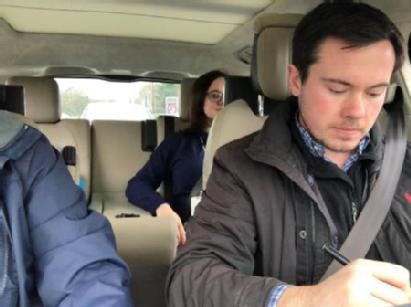
“Being able to reduce an individual’s personal susceptibility to motion-sickness using simple ‘brain training style’ tasks training is a massive step-forward in the development of future transport systems, including autonomous vehicles. Human factors research is all about how we can design products and services that are pleasurable. Motion sickness has, for a long time, been a significant limitation to many peoples transport options and this research has shown a new method for how we can address this.
“I hope that in the future we can optimise the training into a short, highly impactful method. Imagine if when someone is waiting for a test-drive in a new autonomous vehicle they could sit in the showroom and do some ‘brain training puzzles’ on a tablet before going out in the car, therefore reducing their risk of sickness. It’s also very likely this method can be used in other domains such as sea-sickness for navy staff or cruise passengers. We are particularly excited about applying this new finding to Virtual Reality headset use.”
Pete Bennett, from Jaguar Land Rover comments:
“Making our future autonomous vehicles as user friendly as possible is key, and motion sickness is something we knew we needed to research as so many people experience it even now as a passenger.
“The research done by WMG has shown that motion sickness can be reduced, and we can incorporate the research into our future vehicle design process.”
Face masks from Beijing to University of Warwick will equip local NHS
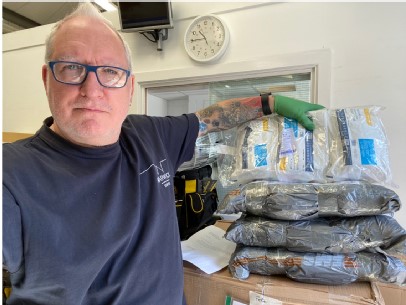 Around 1000 face masks, donated by Beijing City University in China to the University of Warwick, will be given to NHS key workers across Warwickshire on the front line against COVID-19.
Around 1000 face masks, donated by Beijing City University in China to the University of Warwick, will be given to NHS key workers across Warwickshire on the front line against COVID-19.
The University of Warwick community is now working to distribute these masks to social care services in North and South Warwickshire, via the NHS Incident Management Teams.
The face masks will be utilised in care homes, hospices, and district care services, where the current supply of personal protective equipment is very low.
Some of the masks will also be used to keep students and frontline workers who remain on the Warwick campus safe.
This weekend, the British Medical Association declared that all key workers should be given a face mask to help slow the spread of the coronavirus.
This donation was made by Professor Liu Lin, President of Beijing City University — an institution with which WMG has a long-standing education partnership.
WMG has collaborated with Beijing City University since 2012 to deliver its Programme and Project Management Masters courses in China.
Professor Stuart Croft, President and Vice Chancellor of the University of Warwick, said: “The Warwick community of students, staff, and partners stretches to every continent on the planet, and its heart is here in Coventry and Warwickshire. On behalf of this community, I thank Professor Liu Lin for the supply of face masks, which will enable us to help keep our neighbours who are most in need safe during this pandemic.
“Together, we are striving to beat the virus – and we will achieve this through co-operation across international borders, driving forward vital research, and supporting our local healthcare workers.”
Margot James is the newly appointed Executive Chair of WMG at the University of Warwick. She commented: “The struggle against this pandemic is global, and it is local. We will only succeed in the fight against COVID-19 by collaborating with our partners around the world, and by protecting key workers in our communities who are on the front line.
“We at WMG and the wider University of Warwick are very grateful for the generosity of Professor Liu Lin and our friends at Beijing City University — and we are proud to draw upon our established international links to support the health and welfare of our region, at a time when the need is greater than ever.”
This is one of numerous ways in which the University of Warwick has worked with its Chinese partners to support the fight against COVID-19 in the UK.
Last week, it was announced that Professors from Warwick’s Department of Engineering have been working with the Association of British Chinese Professors in raising funds to purchase personal protective equipment for ten UK hospitals.
They secured 2400 face masks for hospitals in London, as well as 3500 safety goggles and 7000 full face visors, which were donated to seven hospitals in London, Cambridge, Birmingham and Coventry.
